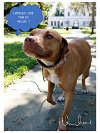Welcome to Pet Rescue By Judy!
401 South Laurel Avenue
Sanford, FL 32771
(407) 302-4497
info@petrescuebyjudy.com
Abagail's Web Page
|
we don't have a picture of Abagail. |
| My Rescue |
| Login to Remember your Favorite Animals and Breeds! |
Name: Abagail
Status: Adopted!
Adoption Fee: $150
Species: Dog
Breed: Basset Hound / Dachshund / Mixed
Learn more about the Basset Hound.Learn more about the Dachshund.
Sex: Female (spayed)
Current Age: 17 Years 10 Months (best estimate)
Microchipped: Yes
Description:
According to www.dogbreedinfo.com, the name Basset Hound comes from the French word "bas" meaning low. Some sources suggest the Basset Hound may have originated from genetic dwarf dogs presented in litters of other types of French hunting hounds, however, we do know that it is a rather old breed, descended directly from the Bloodhound. Shakespeare described the Basset Hound with the following poetic image: "Ears which sweep away the morning due." According to research, the true fame of the Basset Hound began in 1863, when it was presented at the Paris Dog Show. Its popularity spread to England where a lively dispute arose between two factions of breeders: Those who wanted to keep the Basset Hound a hunting dog, and those who wanted to transform it into a companion dog. Situated between these two factions were the American breeders who proceeded to develop an extremely pleasing companion dog without sacrificing any of the qualities of the hunter. The breed was recognized by the American Kennel Club in 1885. Its natural bent is for hunting both in the den and in the open. It is therefore, used for the hunting of fox, hare, opossum, and pheasant. Bassets can hunt in packs or alone. It has an excellent sense of smell, but its reflexes are a bit slow. Their slow pace is convenient for hunters on foot and keeps game from being scared out of reach. The Basset's nose is almost as outstanding as the Bloodhound's. George Washington may have owned Basset Hounds given to him by Lafayette after the American Revolution.
The Basset Hound is sweet, gentle, devoted, peaceful and naturally well-behaved. They fit into family life well. Their temperament should always be friendly with never an indication of sharpness or viciousness. They are mild but not timid; very affectionate with its master and friendly with children. It is incapable of biting, but it may be a bit stubborn. They like to do tricks for food. It has a deep musical bark. Housebreaking is difficult, but they do well with gentle patient training and positive reinforcement. With proper training, they are obedient, but when they pick up an interesting smell, it's sometimes hard to get their attention. They have a life expectancy of 10-12 years.
According to www.dogbreedinfo.com, the name Basset Hound comes from the French word "bas" meaning low. Some sources suggest the Basset Hound may have originated from genetic dwarf dogs presented in litters of other types of French hunting hounds, however, we do know that it is a rather old breed, descended directly from the Bloodhound. Shakespeare described the Basset Hound with the following poetic image: "Ears which sweep away the morning due." According to research, the true fame of the Basset Hound began in 1863, when it was presented at the Paris Dog Show. Its popularity spread to England where a lively dispute arose between two factions of breeders: Those who wanted to keep the Basset Hound a hunting dog, and those who wanted to transform it into a companion dog. Situated between these two factions were the American breeders who proceeded to develop an extremely pleasing companion dog without sacrificing any of the qualities of the hunter. The breed was recognized by the American Kennel Club in 1885. Its natural bent is for hunting both in the den and in the open. It is therefore, used for the hunting of fox, hare, opossum, and pheasant. Bassets can hunt in packs or alone. It has an excellent sense of smell, but its reflexes are a bit slow. Their slow pace is convenient for hunters on foot and keeps game from being scared out of reach. The Basset's nose is almost as outstanding as the Bloodhound's. George Washington may have owned Basset Hounds given to him by Lafayette after the American Revolution.
The Basset Hound is sweet, gentle, devoted, peaceful and naturally well-behaved. They fit into family life well. Their temperament should always be friendly with never an indication of sharpness or viciousness. They are mild but not timid; very affectionate with its master and friendly with children. It is incapable of biting, but it may be a bit stubborn. They like to do tricks for food. It has a deep musical bark. Housebreaking is difficult, but they do well with gentle patient training and positive reinforcement. With proper training, they are obedient, but when they pick up an interesting smell, it's sometimes hard to get their attention. They have a life expectancy of 10-12 years.
Copyright © Pet Rescue by Judy





